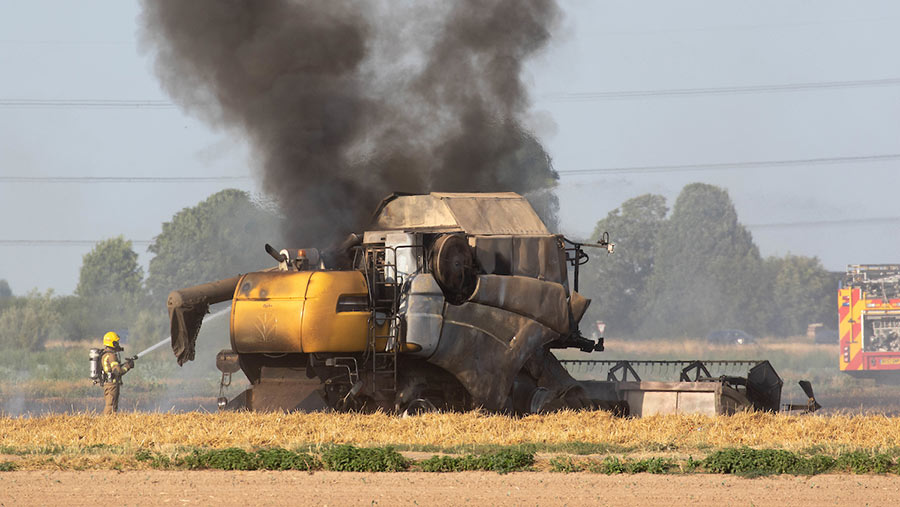Farmers told to manage fire risk or see insurance cost rise
 © Tim Scrivener
© Tim Scrivener With harvest in full swing across much of the country and with temperatures on the rise, farmers are being urged to pay even closer attention than normal to the possibility of combine fires – or risk seeing their insurance premiums rise.
“The drought and heat of the 2018 harvest saw record numbers of combines destroyed by fire, and again in 2019 we are into harvest with tinder-dry conditions in many areas,” warned Nigel Wellings of Acres Insurance Brokers.
See also: Retrofit fire suppression kit could save burning combines
“As a result, insurers will be looking more closely at fire claims on combines this year and starting to draw some conclusions that may be implemented in future.”
With insurance premiums typically set at £2,500 to £3,500 for a £350,000 combine (depending on the claims history), Mr Wellings believes management of fire risk needs to be taken seriously.
“Already, since last harvest, we have seen some insurers increasing premium rates on combines – and in some cases insisting on fire-suppression systems where a previous combine has been written off.”
Joint action
Mr Wellings says action needs to be taken by both manufacturers and operators to avoid further increases.
“From a manufacturer standpoint, I would like to see compressed air systems that automatically blow off around the engine bay and high risk hydraulic and electrical areas, at set time intervals, incorporated as a standard item on all new machines.
“On the options list for all new combines, a fire suppression system should also be available at a reasonable price.”
He also suggests combine operators incorporate best practice into their daily harvest routines, in order to avert some fires and prevent future insurance premium rises (see panel below).
See also: Combine harvester fires: Why do they keep happening?
Combine operator tips to avoid fires
- Consider blowing the combine off with a high-pressure mobile compressor twice a day in hot conditions, ideally late afternoon and last thing in the evening.
- If you don’t blow down the machine last thing at night, at least walk around it, checking the engine bay area for any smell or sign of smouldering debris.
- Ensure you have decent-sized fire extinguishers on all combines and tractors – and make sure they have been tested.
- If possible, leave a piece of cultivation kit, such as a set of discs or plough, somewhere on each block of land you are working so a cultivated fire break can be quickly established.
- Also, if possible, leave a water source such as a sprayer, bowser or slurry tanker on the block of land you are working in.
- Have a written risk assessment and procedure, so that all staff have been trained and know what to do in the event of a fire starting, be it on a machine or in a crop.
- Remind grain trailer drivers to be constantly alert for any signs of smoke from combine, crop or stubble.
- Ensure grain trailer drivers have a working means of communication with combine drivers and others, such as two-way radios, especially in areas with poor mobile phone reception. Check the batteries are fully charged.
